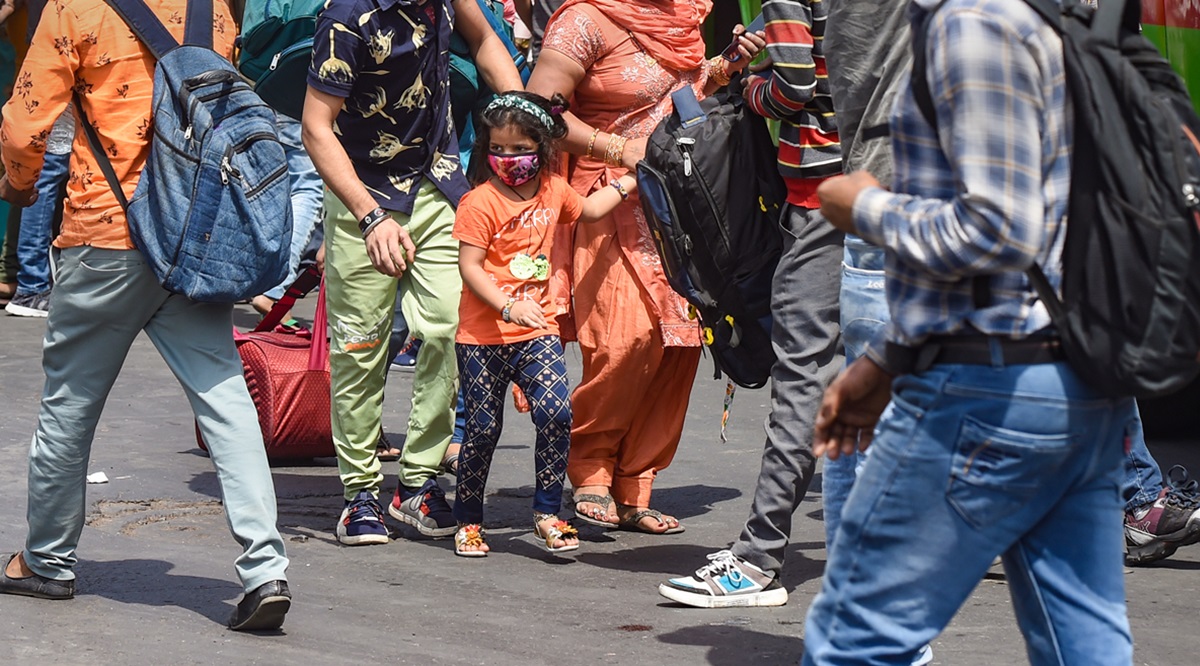 Passengers at Anand Vihar Bus Terminal in New Delhi, Wednesday, April 14, 2021. (PTI Photo/Manvender Vashist, File)
Passengers at Anand Vihar Bus Terminal in New Delhi, Wednesday, April 14, 2021. (PTI Photo/Manvender Vashist, File)
ये समय लापरवाही का नहीं है जबकि हमारे नौनिहाल ,बालक -वृन्द , छात्रागण ,किशोर -किशोरियां भी कोविड संक्रमण की दिनानुदिन चपेट में आते जा रहे हैं। विषाणु सार्स -कोविड -२ अपनी कांटेदार प्रोटीन -कोट बदल रहीं हैं उत्परिवर्तित हो रही है। दो -दो बार। डबल म्युटेंट किस्म भारत में दर्ज़ हुई है। ब्रिटेन ,दक्षिण अफ्रिका और भारत म्युटेसन किस्म के मामले में एक दूसरे से बाज़ी मार रहे हैं।
कोई उम्र का लिहाज़ नहीं करता है यह आतताई विषाणु नवजात पैदा होते ही इसकी चपेट में आएं हैं। डेढ़ माह का एक शिशु आईसीयू में पहुंचा है। चार से छः हफ्ता शिशु ,०-१७ साला टोली इसकी जद में आ चुकी है।
भले किशोर -किशोरियों में लक्षण उग्र न भी हों आगे काविड के तेज़ फैलाव का खतरा बदस्तूर कायम है। शिशुओं में बालकों में तीन दिन की अवधि तक तेज़ ज्वर बना रहे ,पेट दर के साथ उलटी दस्त शिकायत ,पेशीय दर्द बदन दर्द ,बे -हद की थकान नै लहर के कोविड रोग के ज्ञात लक्षण हैं।
यह डरने का नहीं सम्भलने अपनी ज़िम्मेवारी समझने का वक्त है। जब आप अपना बचाव करते हैं तब आप अन्यों को भी बचा रहे हैं। खुद बचे रहे ,शिशुओं को बचाये रहें सब बच जाएंगे।
एकै साधे सब सधै, सब साधे सब जाय।‘रहिमन’ मूलहि सींचिबो, फूलहि फलहि अघाय॥
The ongoing Covid-19 surge is taking a toll on children’s health with several hospitals reporting a sharp rise in the number of children between the age of one and five landing up in hospitals. Unlike last year, the virus is affecting infants, with some as young as one-and-a-half months old getting admitted to hospital.
Dr Dhiren Gupta, Pediatric Intensivist at Sir Ganga Ram Hospital, said, “The virus is spreading to the pediatric age group in the current surge. The number of children coming to the hospital with Covid-19 has increased five times as compared to last year. We even have a three-month-old infant admitted to the ICU with Covid-19 and pneumonia. While we are getting swamped with young children and teenagers, the most affected age group is between one to five years in this category.”
On Wednesday, Delhi reported the highest single-day spike with 17,282 new cases of Covid-19 and 104 deaths. A total of 1,08,534 tests have been conducted with 15.92 per cent people testing positive for the infection.
The most common symptoms observed in children include high fever, vomiting, diarrhea and headache.
Dr Rahul Nagpal, Director, Pediatric and Neonatology at Fortis Hospital Vasant Kunj, said, “We are getting a lot more children now across all age groups. The youngest child who has Covid-19 is six weeks old. The number was insignificant last year but it has increased exponentially this time. The families of most of the younger ones are also positive. Even teenagers are getting infected, and, in that case, only one or two family members are affected.”
At least 50 per cent of the children surveyed during the fifth round of serological surveillance in Delhi were found to have antibodies against Covid-19, indicating that children do have equal exposure and an adequate number of antibodies levels when compared to adults.
A total of 1,307 children above five years and less than 12 years were included in the survey that had tested 28,000 people between January 15 and January 23. The prevalence was higher among females with 52.49 per cent of those tested having antibodies, while 48.41 per cent males were found to have the antibodies against the virus.
According to the doctors, the surge in cases can be attributed to the laxity in the behaviour of the general public over the last few days. While the severity in younger children is not very high, experts feel that adults in the family should continue following Covid-appropriate behaviour to ensure no one else is infected in the family.
Dr A J Chitkara, director & HOD, pediatrics at Max Super Speciality Hospital, Shalimar Bagh, said, “Since people were taking due precautions, the number was much less last year. This second surge is affecting many children, especially those younger than five years. This is also because the overall number of adults getting infected is more and somehow people have stopped following the Covid-appropriate behaviour. Fortunately, younger children do not suffer much, but it doesn’t mean they don’t suffer at all. If the child runs a high fever beyond three days, is irritable, refuses to eat, breathes heavily or gets severe abdominal pain or diarrhea, then the patient must contact a pediatrician at the earliest.”
कोई टिप्पणी नहीं:
एक टिप्पणी भेजें